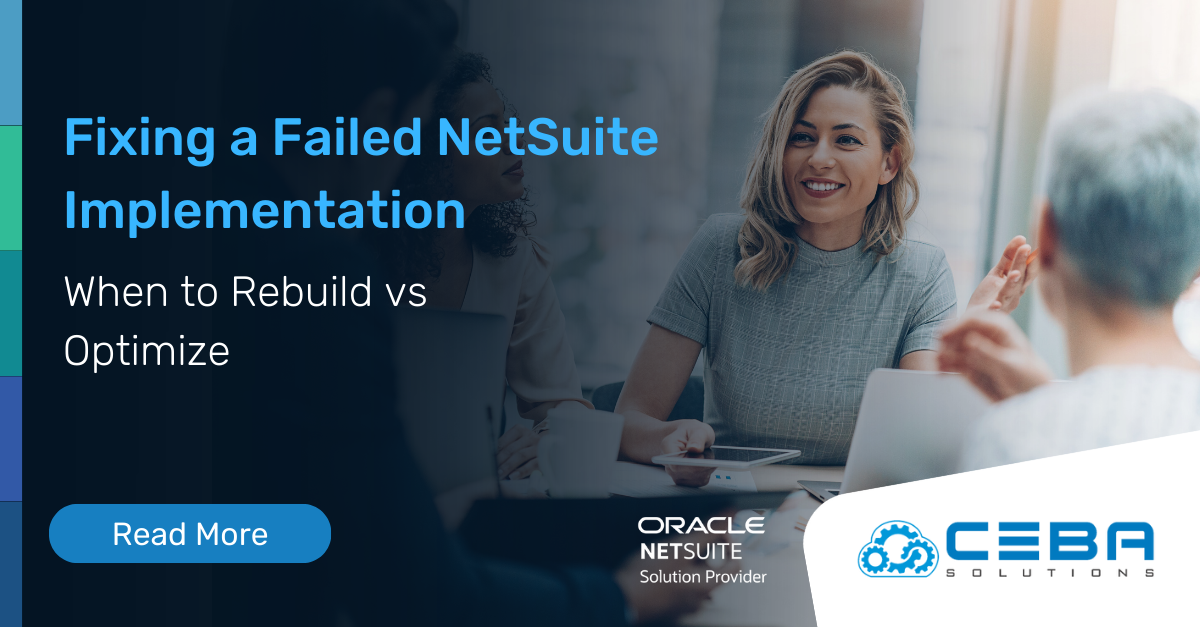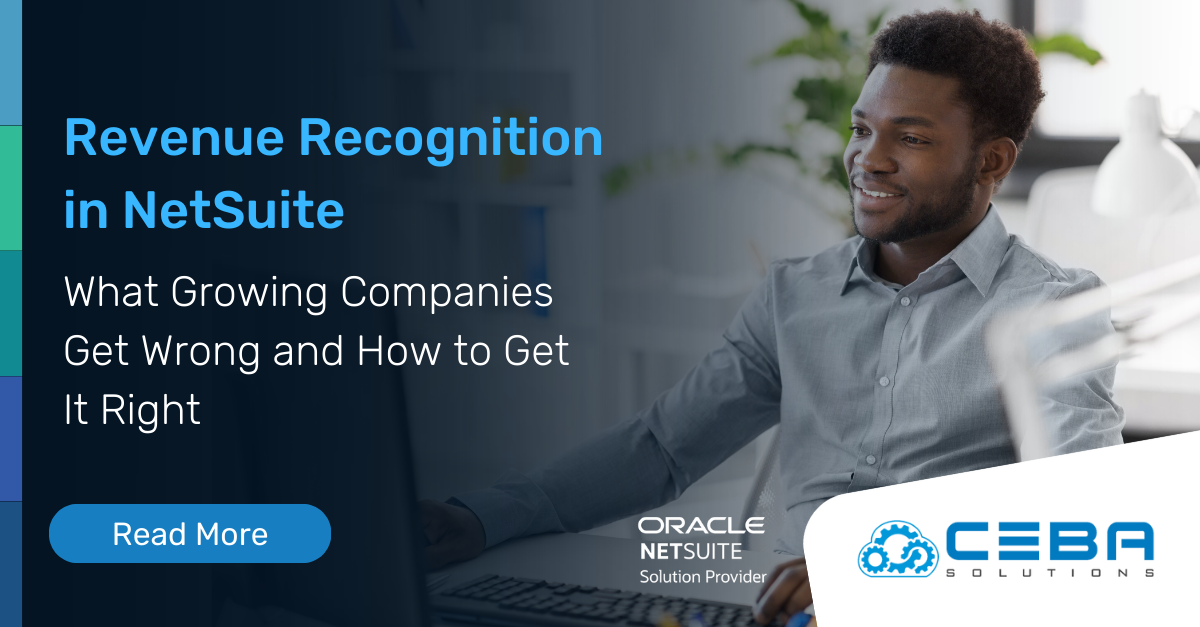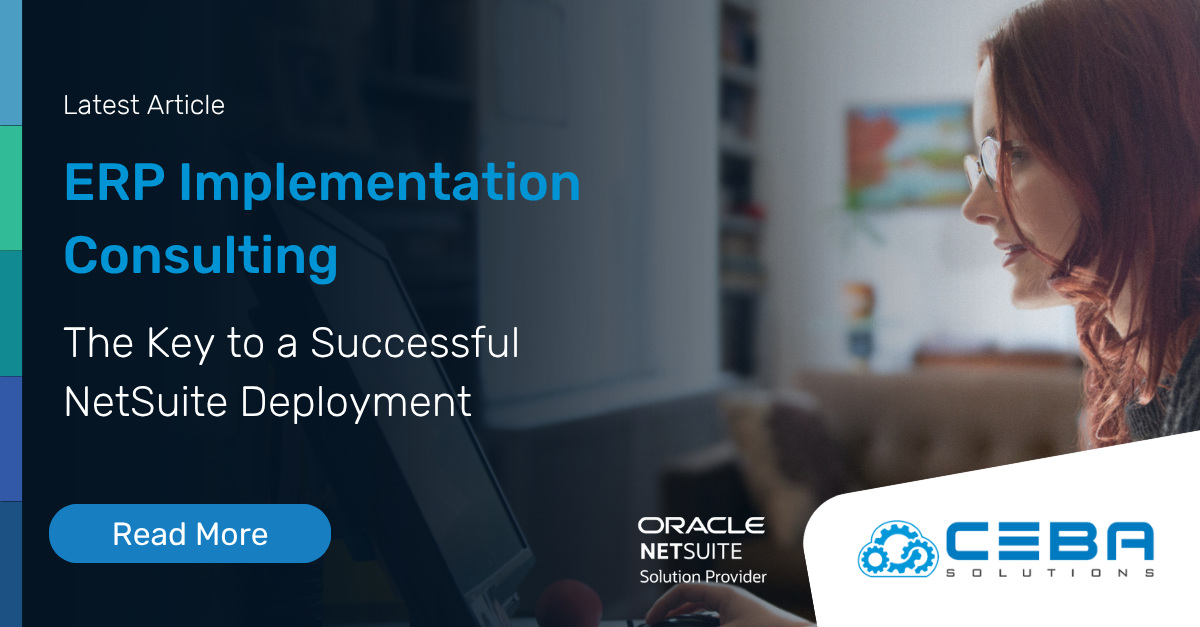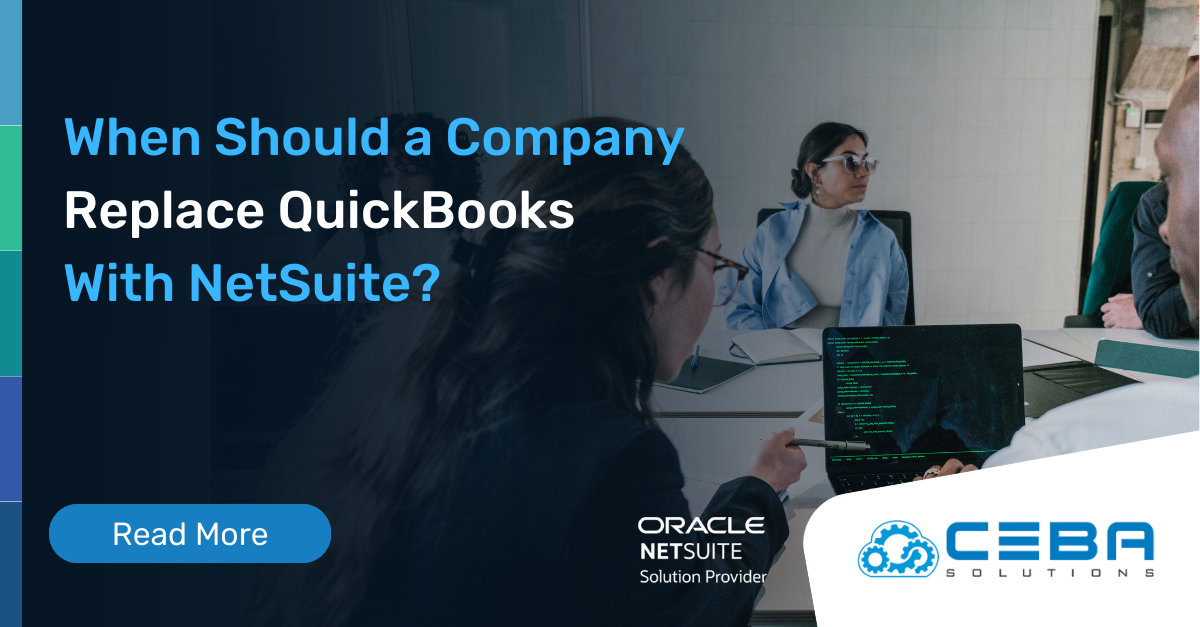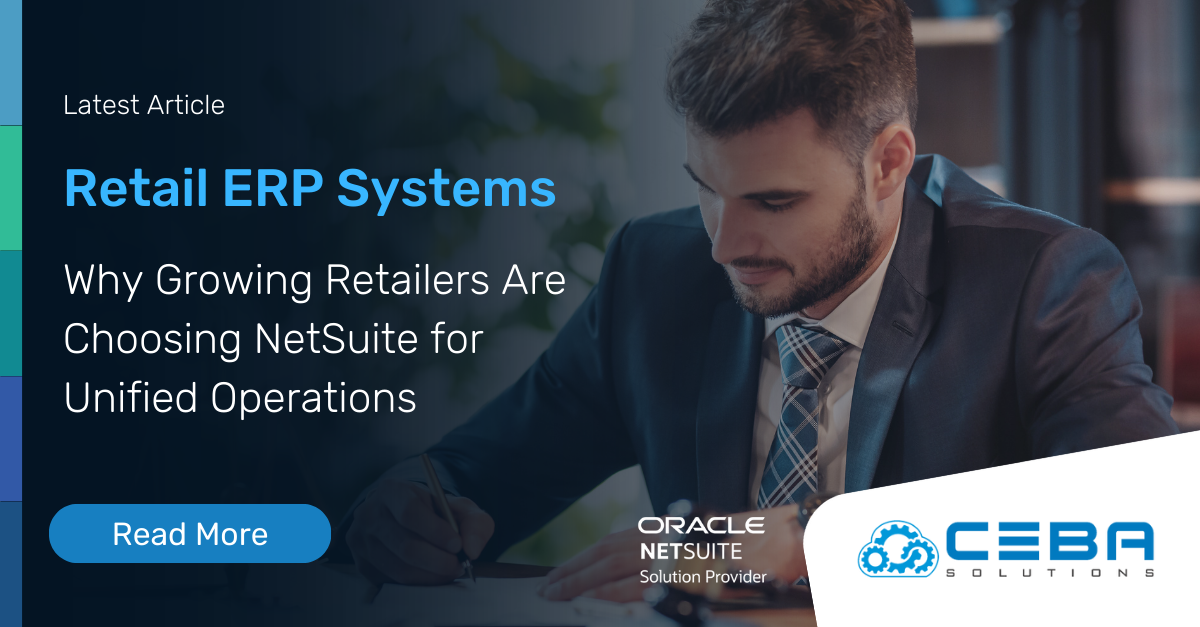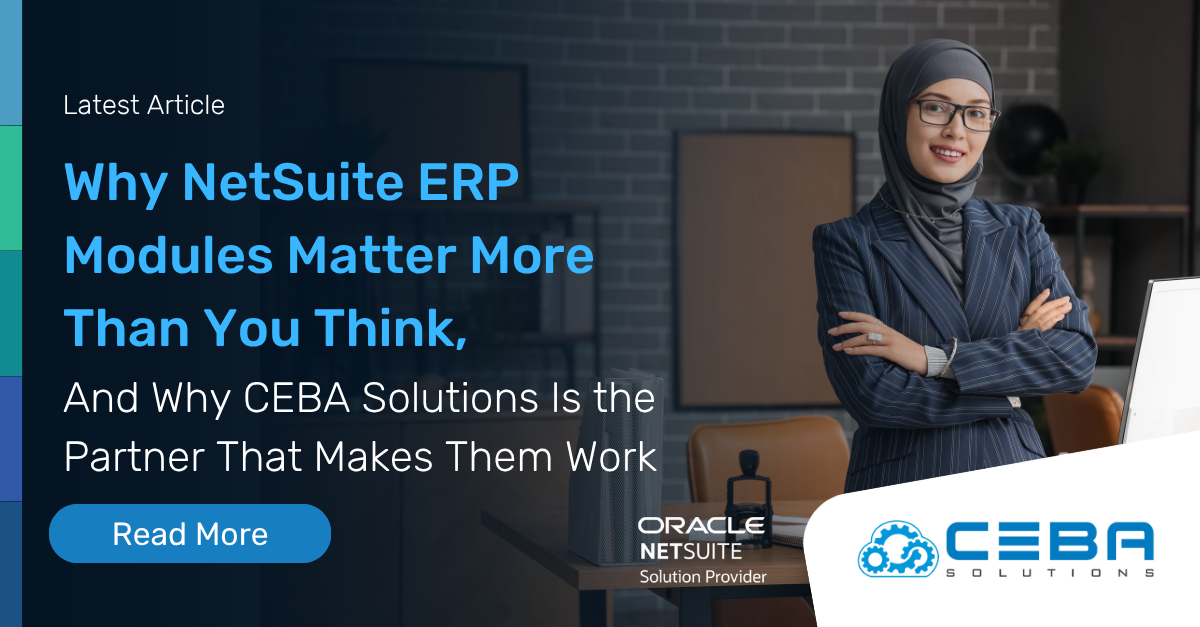
What is a Fully Integrated ERP and What are the Benefits for Small Business?
What is a Fully Integrated ERP and What are the Benefits for Small Business?
As small businesses grow, it becomes increasingly challenging to manage their operations without a fully integrated ERP solution. Small businesses, including retailers and eCommerce companies, need a comprehensive solution that can help them streamline their business processes and automate their day-to-day operations. This is where Enterprise Resource Planning (ERP) systems like NetSuite come into play.
In this article, we will discuss what a fully integrated ERP is, and the benefits it can offer to small businesses.
Small Business Integrated ERP Software, an Introduction
Small businesses often struggle with managing their operations efficiently. They may have limited resources, and manual processes can be time-consuming and prone to errors. Enterprise Resource Planning (ERP) systems can help small businesses manage their operations more effectively. A fully integrated ERP system can provide small businesses with the necessary tools to streamline their processes, automate their operations, and make better decisions.
What is a Fully Integrated ERP?
A fully integrated ERP system is a software solution that integrates all the core business processes, including finance, accounting, inventory, human resources, and customer relationship management, into a single system. A fully integrated ERP system provides a comprehensive view of the business and enables businesses to make data-driven decisions.
A fully integrated ERP system is different from standalone software applications that do not integrate with other systems. A fully integrated ERP system provides a centralized database that allows different departments to access the same information in real-time, reducing duplication of efforts and errors.
Zabe Siddique - President - CEBA Solutions
The State of eCommerce
Global e-commerce revenues hit new highs in 2022, driven in part by a shift in consumer buying behaviors during the pandemic and also by the steady increase in business-to-consumer (B2C) sales that were already shifting online. According to eMarketer, worldwide retail ecommerce sales grew 27.6% to $4.280 trillion in 2020 (while worldwide retail sales declined by 3.0% to $23.839 trillion). For 2021, the research firm is forecasting global ecommerce growth of 14.3%.
Wanting to grab their share of the growing ecommerce pie, B2C companies are reaching into new markets, attracting new customer segments, and broadening out their product offerings. Many are also looking at their current business systems and realizing that their disparate applications, disconnected solutions, and spreadsheets simply don’t cut it anymore.

Download the Ultimate Guide to Oracle NetSuite
Learn why NetSuite is the #1 Cloud ERP for Small and Mid Size Businesses Focused on Unlocking Growth. Download the Guide
Why Integrated ERP is the Key to Digital Transformation
An integrated ERP system that offers end-to-end visibility and real-time information can give these companies the agility they need to scale their businesses and meet customer expectations in today’s digital world.
Like many organizations that are facing the forces of “digital transformation” change in 2021, B2C e commerce organizations need integrated, cloud-based enterprise systems that can run their end-to-end operations. These disparate, inflexible systems were often cobbled together as the company’s needs grew—a new system for fulfillment added one day, and a completely different invoicing application tacked on the next.
While functional in their own right, these bolted-on and basic systems can literally throttle a business’ growth and potential. Team members manage in information silos; reports take weeks to generate and share; and getting a 360-degree view of business performance is nearly impossible.
To help solveFor help solving these problems, B2C ecommerce companies are turning to cloud enterprise resource planning (ERP) solutions like NetSuite, which bring all facets of their business onto a single, unified platform that can be accessed from anywhere.

12 Reasons to Consider Integrated Cloud ERP
For help solving these problems, B2C ecommerce companies are turning to cloud enterprise resource planning (ERP) solutions like NetSuite, which bring all facets of their business onto a single, unified platform that can be accessed from anywhere. Here are eight more reasons why all B2C companies need an integrated ERP:
1. Save time.
Running an ecommerce business involves a wide range of tasks - from entering data into forms to responding to customer requests to expediting orders, and everything in between. When some or all of these tasks are automated using an integrated ERP, it reduces the need for manual processes, minimizes errors, and allows team members to focus on more important, high-value tasks.
2. Get orders out the door quickly.
Once an order is placed online, you have to be able to process, pick/pack, and ship that order as quickly as possible in order to meet your customers’ delivery time frame expectations. Getting these steps accomplished across hundreds or thousands of orders daily requires a well-orchestrated process that can’t be easily accomplished using multiple disparate solutions and manual systems.
3. Close the operational gaps.
As products physically move from the distribution center to the transportation mode to the final destination, an ERP can manage any and all of these processes that may have previously been handled manually (or, using a patchwork of different applications). With an integrated ERP, order data is transferred in real-time to order management, warehousing systems, and transportation management systems (among others). This helps ecommerce companies close operational gaps and create a more streamlined, end-to-end supply chain.
4. Get happier customers.
The correlation between customer service and customer is stronger than ever in today’s ecommerce selling environment, where the next competitor is always just one single mouse click or screen tap away. When CEBA’s B2C ecommerce clients integrate their ecommerce storefront with an ERP, customer service reps can respond to requests, fix problems, and address issues faster. They can also provide order status updates, handle refunds/returns, and do everything else that customers have come to expect in today’s fast-paced e commerce environment.
5. Improve inventory management.
The days when it was okay to have incorrect inventory numbers posted on an ecommerce storefront are long gone, and customers know it. They expect to be able to check stock, get accurate inventory location information, and get an accurate ship date without having to make a call or send an email. Using an integrated ERP, B2C ecommerce companies have a complete, updated view of their inventory, know when to replenish, and understand where everything is at any given time.
6. Give customers order updates.
At CEBA Solutions, we know customers want their orders fulfilled in full and on time. And when that doesn’t go exactly as planned, they want accurate order updates. Using NetSuite ERP, we help ecommerce companies track information and share it with their own customers in real-time and around the clock. By automating customer updates, for example, companies can not only more efficiently address requests, but their customer service teams can be freed up to focus on more complex requests.
7. Improve the online experience.
The better your customers’ online experience, the more they’ll return to your B2C store for products and services. By combining an integrated ERP solution like NetSuite with an experienced implementation partner like CEBA Solutions, you can vastly improve your customers’ online experience and keep them coming back for more. For example, your ERP will automatically receive orders, manage fulfillment, notify customers when their orders ship, and let you know when those shipments are received.
8. Increase productivity.
If manual processes and a “hairball” of disparate technology systems are holding your company back, it’s time to get onboard with an integrated ERP that all team members can use as a single source of truth. Rather than asking each other for spreadsheets, searching the warehouse for stock, and/or transferring data back and forth between systems, team members can tap into the ERP’s automated capabilities and focus only on core tasks. This not only helps increase productivity, but it will also make people want to work for your tech-forward, modern company for years to come.
9. Provide customers with an omni-channel experience.
Omnichannel is the new normal for B2C ecommerce companies, and customers have come to expect it. With an integrated ERP, you can provide your customers with a consistent experience regardless of how or where they interact with your company. Customers will appreciate being able to shop on your website, in your retail store, or through a mobile app and receive the same level of service no matter which channel they use.
10. Make data-driven decisions.
In order to make sound business decisions, you need access to accurate, real-time data that’s been cleansed and normalized. With an ERP in place, you can ditch the spreadsheets and get the information you need when you need it. This will enable you to make decisions based on data rather than gut feel, and that’s always a good thing.
11. Get ahead of the competition.
The bottom line is that if you want to stay competitive in today’s B2C ecommerce landscape, you need an integrated ERP. It’s simply not possible to keep up with the competition without one. With an ERP like NetSuite in place, you’ll be able to do things like automate order management, improve customer service, and provide a better omnichannel experience for your customers.
12. Centralized Data for More Accurate Reporting
The data that's siloed in different departments and systems is a constant challenge for businesses. When it comes time to do reporting, this data needs to be accurate and up-to-date. With an ERP, all of your company's data is centralized into one system. This provides one source of truth for your business and makes reporting more accurate.
13. Improved Operational Efficiency
A fully integrated ERP system can help small businesses automate their processes and reduce manual tasks. This can improve operational efficiency, reduce costs, and increase productivity. For example, an ERP system can automate tasks such as invoicing, purchase orders, and payroll, reducing the time required to complete these tasks manually.
How to Choose the Right Fully Integrated ERP for Your Small Business
Choosing the best ERP system for small business can be a challenging task. Here are some factors to consider when selecting an ERP system:
Consider Your Business Needs
Before selecting an ERP system, it's essential to understand your business needs. Consider your industry, the size of your business, and the specific features you require. For example, if you run a manufacturing business, you may need an ERP system that includes production scheduling and quality control features.

Evaluate the ERP System's Features
Evaluate the ERP system's features to ensure that they meet your business requirements. Look for an ERP system that includes the features you need, such as inventory management, order processing, financial management, and customer relationship management.
Look for an ERP System with Good Support
Choose an ERP system that offers good support. Ensure that the vendor provides training, installation, and ongoing technical support to ensure that your system operates smoothly.
Consider the Total Cost of Ownership
Consider the total cost of ownership when selecting an ERP system. This includes the software licensing fees, hardware requirements, implementation costs, and ongoing maintenance and support fees.
Conclusion
Small businesses face many challenges when managing their operations, and manual processes can be time-consuming and error-prone. Implementing a fully integrated ERP system can provide small businesses with the necessary tools to streamline their processes, automate their operations, and make better decisions. By choosing the right fully integrated ERP system, small businesses can improve their operational efficiency, reduce costs, and enhance customer satisfaction.
Are You Interested in Learning More?
Combined, these benefits should make any B2C ecommerce company want to explore the possibilities that NetSuite Cloud ERP and CEBA Solutions have to offer. Contact us today to get the conversation started: www.cebasolutions.com.
CEBA Solutions is a NetSuite Solution Provider specializing in NetSuite implementations for companies across North America. We’ve helped businesses in a wide range of industries, from retail and manufacturing to distribution and software, get the most out of their NetSuite investment. Our team of certified NetSuite experts will work with you to assess your business needs and recommend the best NetSuite solution for your company. We’ll also be there to provide support and training every step of the way.
What is an ERP system, and how does it work?
An Enterprise Resource Planning (ERP) system is a software solution that integrates all the core business processes, including finance, accounting, inventory, human resources, and customer relationship management, into a single system. A fully integrated ERP system provides a comprehensive view of the business and enables businesses to make data-driven decisions. The ERP system works by providing a centralized database that allows different departments to access the same information in real-time, reducing duplication of efforts and errors. This ensures that everyone in the organization has access to the most up-to-date information.
What are the benefits of using an ERP system for small businesses?
Implementing a fully integrated ERP system can provide several benefits to small businesses. These benefits include centralized data management, improved operational efficiency, better decision-making, enhanced customer satisfaction, and cost reductions. A fully integrated ERP system provides a centralized database that allows businesses to manage their data more effectively. This can improve operational efficiency, reduce costs, and increase productivity. An ERP system can provide businesses with real-time data on their finances, inventory levels, sales, and other key performance indicators, allowing them to make data-driven decisions.
How do I choose the right fully integrated ERP system for my small business?
Choosing the right fully integrated ERP system for your small business can be a challenging task. To choose the right ERP system, consider your business needs, evaluate the ERP system's features, look for an ERP system with good support, and consider the total cost of ownership. Before selecting an ERP system, understand your business needs, such as your industry, the size of your business, and the specific features you require. Evaluate the ERP system's features to ensure that they meet your business requirements. Choose an ERP system that offers good support and provides training, installation, and ongoing technical support.
Can an ERP system help reduce costs for small businesses?
es, a fully integrated ERP system can help small businesses reduce costs. An ERP system can automate certain tasks such as invoicing and purchasing, reducing the need for manual labor and paper-based processes. This can help businesses save time and money, as well as reduce errors and discrepancies. By reducing manual processes, businesses can increase their operational efficiency, reducing costs and increasing productivity.
What features should I look for in a fully integrated ERP system for my small business?
When selecting a fully integrated ERP system, consider the specific features that your small business requires. Some of the essential features to look for include inventory management, order processing, financial management, and customer relationship management. Depending on your industry, you may need additional features, such as production scheduling, quality control, or supply chain management. Ensure that the ERP system provides the features you need to manage your business operations effectively.




